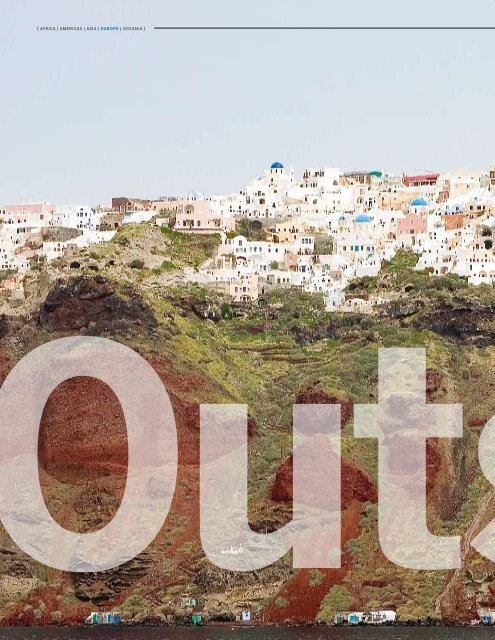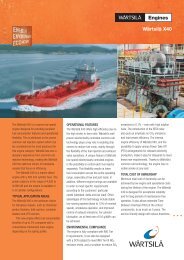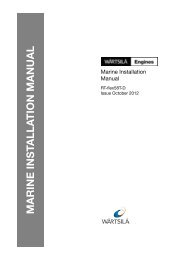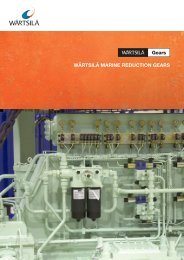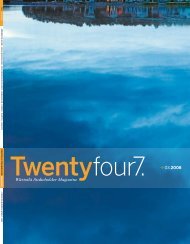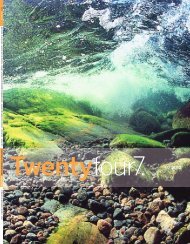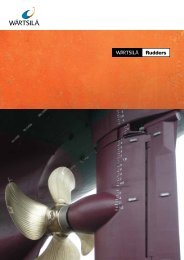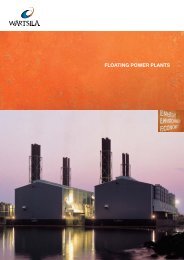Outside - Wärtsilä
Outside - Wärtsilä
Outside - Wärtsilä
Create successful ePaper yourself
Turn your PDF publications into a flip-book with our unique Google optimized e-Paper software.
[ AFRICA | AMERICAS | ASIA | EUROPE | OCEANIA ]<br />
uts
eportage<br />
ide<br />
living and prospering<br />
the grid<br />
21
Ferry traffic and<br />
electricity generated<br />
using diesel engines<br />
are two essential<br />
lifelines in the<br />
Cyclades, the Greek<br />
islands located<br />
southeast of Athens.<br />
22 Twentyfour7. 2.08<br />
TEXT ANd PhOTOS: VESA ESKOLA<br />
It’s not yet seven o’clock in the morning, but Piraeus, the port city on the hem of<br />
the Greek capital city, is a hive of activity as the big ferries moored at the quays<br />
swallow a constant stream of people and vehicles. And this is only mid April, the<br />
off-season. In summer and early autumn, the harbour is filled to bursting point<br />
with tourists heading out to islands in the Greek archipelago.<br />
Ferrying around. We’re standing on the aft deck of m/f Blue Star Naxos, a<br />
124-metre ferry which can carry 1450 passengers and 240 cars. The deck is gently<br />
vibrating to the rhythm of the ship’s engines. It’s a soothing element in the electric<br />
atmosphere that accompanies departure. Even if this trip is not heading for the<br />
unknown, adventure sparkles in the air. The salt sea air always evokes romance.<br />
The first rays of the sun start to caress the people out on deck enjoying the<br />
view: regular tourists, backpackers, opportunists, adventurers, people on business,<br />
relatives setting out to visit their families... Some share our excitement, others are<br />
clearly not so excited.<br />
These ferries are literally the lifeline of the Greek islands. Beside their human<br />
cargo, they also transport every kind of consumer good from matchboxes to<br />
ovens, all kinds of supplies and of course bills and love letters side by side – all the<br />
things that modern civilization requires to function.<br />
The logistic challenge is enormous. Roughly 120,000 people are scattered<br />
around 200 islands. And in summer, visitors outnumber the inhabitants many<br />
times over.
All of a sudden, hawsers are loosened and then cast off. The four powerful<br />
<strong>Wärtsilä</strong> 9L32 engines turn the propellers ever faster. Passengers on deck<br />
wave, people left on the pier honk their car horns.<br />
every iSLand iS one oF a kind. Our first stop is Syros, which is followed<br />
by Paros. After that come Naxos, Ios, Santorini, Iraklia, Schinousa, Koufonisi,<br />
Donousa, Amorgos and Astypalea. Here, shipping lines are essentially bus<br />
routes and halts are frequent. We step off in Paros, windsurfing paradise and a<br />
hub for the islands’ ferries. From here you can take other boats to explore the<br />
Cyclades.<br />
But instead of beach-hopping, we visit the power plant, an unremarkable<br />
concrete building located on the island’s most distant corner. While tourists<br />
are unlikely to ever see it, they could miss it - without the power it generates<br />
there would be no ice in their drinks, no hot water in the shower and no air<br />
conditioning.<br />
Every island has its own power plant, many of them powered by <strong>Wärtsilä</strong>.<br />
And as every island is unique, they all have their peculiarities when it comes<br />
to producing electricity.<br />
“There are two types of islands in Greece,” says nikolas g. vythoulkas,<br />
Business Development Manager, <strong>Wärtsilä</strong> in Greece. “The first group consists<br />
of Rhodes and Crete, the large islands which have fairly big populations.<br />
Energy demand there is pretty constant throughout the year but of course it<br />
peaks in the summer.”<br />
“The Cyclades, islands such as Paros and Santorini, are in the second<br />
group,” Vythoulkas continues. “In the winter, energy consumption is no more<br />
than 4-5 MW, but demand is ten times higher in July and August. If the<br />
power plants were to be operated by private companies, hardly anyone would<br />
be interested. Investing for a peak period that lasts just a couple of months<br />
is not good business. You would never earn your money back. That’s why<br />
p<br />
ferries are a vital lifeline for<br />
the 120, 000 inhabitants of<br />
the greek islands. [far left]<br />
reportage<br />
chapels and roadside shrines<br />
offer everyone - both residents<br />
and visitors - a chance to<br />
rest and reflect. [above]<br />
timetables are tight, with<br />
loading and unloading<br />
completed in minutes. [above]<br />
2.08 Twentyfour7. 23
24 Twentyfour7. 2.08
electricity is distributed by the state-owned Public Power Company<br />
(PPC).”<br />
Inside the power plant, this dilemma is easy to understand. Of the<br />
plant’s ten engines, only a few are currently running, the others sit<br />
idle. Some are undergoing thorough maintenance before the holiday<br />
season starts. About 15 MW of electricity is being produced.<br />
The guide for our tour is Michael Chaniotis, Manager of<br />
Operations. As we walk around, the plant’s history can easily be<br />
read from the equipment: a Sulzer-Fincantieri, two GMT Fiats, a<br />
MAN B&W 2-stroke, a few Cegielski gas turbines and two <strong>Wärtsilä</strong><br />
12V46 engines. It’s a fascinating orchestra, with the 2-stroke engine<br />
in particular making it a fairly unusual combination, even in an<br />
island location.<br />
All the engines have been installed one after another as the demand<br />
for energy has increased. And it’s still growing. Peaks in Paros<br />
already rise well above the 60 MW level.<br />
LoSing one’S SenSeS. After checking into a cosy hotel overlooking<br />
the port, we take a stroll through the maze of tiny alleys in the old<br />
town. Here, it’s easy to lose not only your sense of direction but also<br />
your sense of time. An old man is selling vegetables from a basket<br />
precariously balanced on the back of his donkey. Time has stopped.<br />
We’re carefully inspected by a dog that’s too lazy to wag its tail.<br />
In less than a couple of months all this will change. In August,<br />
hardly a room will be vacant. But for the time being, we enjoy<br />
the calm and silence of the narrow side streets. The main alleys<br />
are dotted with tourist shops, small cafes (no Starbucks here) and<br />
restaurants (no McDonald’s either). No-one appears to be in a<br />
hurry – the charm of these Greek villages is hard to match and the<br />
hospitality is among the best there is.<br />
Life could be a lot worse. It’s easy to forget how isolated these<br />
islands really are. In a way, the power plants are the guardians of life.<br />
“The islands are heavily dependent on tourism, so power supplies<br />
have to be very stable: blackouts hurt the economy – and not only<br />
in the islands,” says yiannis Christopoulos, Service Manager of<br />
<strong>Wärtsilä</strong> in Greece. “Nobody wants to be on vacation without<br />
electricity if you’ve paid for it. Electricity is crucial to the economy.<br />
The first thing that people investing in the tourist industry check<br />
p<br />
located as they are halfway between<br />
italy and turkey, food in the greek<br />
islands happily blends influences<br />
from east and west. [far left]<br />
Generating capacity supplied<br />
by <strong>Wärtsilä</strong> in the Greek<br />
islands now totals 520 MW.<br />
Responsibilities include<br />
service and spare parts.<br />
reportage<br />
2.08 Twentyfour7. 25
spacious terraces often feature<br />
gardens or even swimming<br />
pools, and offer stunning views.<br />
26 Twentyfour7. 2.08<br />
The hunger for electricity grow<br />
– in some islands by<br />
p
s constantly<br />
as much as 5–10% each year.<br />
what comes around<br />
goes around<br />
reportage<br />
A GROUP OF ABOUT 220 ISLANdS,<br />
the Cyclades is home to an estimated<br />
120,000 people. While Naxos is the<br />
biggest island, both Mykonos and<br />
Santorini are far better known. Each<br />
island has its own unique character and<br />
charm. Some are known for their wild<br />
night life, others for peace and quiet.<br />
ThE NAME FOR the islands comes<br />
from kyklos, a Greek word that means a<br />
cycle. It’s a logical choice, as the islands<br />
form a circle around Delos – the holy<br />
island which is one of the country’s most<br />
important mythological and historical<br />
sites. Among other legends, it’s the<br />
birthplace of Apollo and Artemis.<br />
IF yOU wANT TO VISIT the Cyclades,<br />
the best way is to board a ship in Piraeus.<br />
Even in the off-season, there are many<br />
routes to choose from. During the<br />
summer months, the possibilities are<br />
almost overwhelming.<br />
BACkPACkERS ARE already roaming<br />
the islands in the spring – the climate<br />
is only moderate but prices are low.<br />
Most tourists arrive at the end of July<br />
and occupy the islands until the end of<br />
August. Prices, quite naturally, go up.<br />
2.08 Twentyfour7. 27
is the power reserves. If capacity exists, they invest. If not, they go<br />
somewhere else.”<br />
“Blackouts are also bad for people’s psyche,” he continues. “They<br />
are living in an isolated location, but don’t need to be reminded<br />
about it. That’s why our people are on standby – customers have to<br />
be able to reach us at any time of the day or night. <strong>Wärtsilä</strong> is the<br />
only company offering 24/7 service in the islands.”<br />
FroM juST a Few kiLowaTTS To 43 Mw. From Paros we<br />
board another Blue Star ferry and cruise via Naxos and Ios, the<br />
legendary party island, to Santorini. The stops in each port are<br />
breathtakingly short – the captain’s<br />
skills have to be admired. After speeding<br />
through the water at some 25 knots, it’s<br />
full speed astern to bring the ship to a<br />
rapid halt. Like parking your car with the<br />
handbrake. Timetables are tight. Loading<br />
and unloading takes no more than a few<br />
minutes. Extraordinary.<br />
As we approach Santorini, it’s easy to<br />
understand its attraction. Villages perched<br />
on high cliffs facing vertical drops of a<br />
hundred metres or more. Houses built<br />
high on soaring terraces.<br />
Even if the first steps towards<br />
civilization were taken in Greece, modern<br />
civilization took its time to reach the<br />
Cyclades. The islands used to be quite<br />
poor. Even electricity took its time.<br />
“In 1930, the towns of Messaria and<br />
Thira had electricity for just two hours<br />
each night – at 110 volts,” says asteris<br />
F. Sardelis, Manager of the Thira Power<br />
Plant. “Things only changed in 1956<br />
when the army stationed troops here. As<br />
they needed electricity, they built a new<br />
plant that produced power at 308 volts.<br />
PPC took over in September 1960, but a<br />
new power plant wasn’t completed before 1968.”<br />
That was the year when electricity cables started to be drawn<br />
into villages and demand for power really started growing. A<br />
native of Santorini, george nomikos, Operations and Project<br />
Manager of the Thira Power Plant, remembers how street lights<br />
were introduced in 1968 – simply by adding light bulbs to the<br />
electricity distribution poles. Then people started to acquire<br />
electrical appliances.<br />
“Our family had a bakery and the first electrical machine we had<br />
was a new food mixer,” says Nomikos. “I think that was in 1970.<br />
Ingredients had previously been mixed by hand. Then we got water<br />
pumps. Television was considered a luxury, a few restaurants were<br />
among the first with television sets. In most homes, a refrigerator<br />
was the first electrical appliance.”<br />
The island’s hunger for power developed quickly. In 1972 there<br />
were already five engines in operation producing a total of 750 kW.<br />
icons old and new can be found<br />
everywhere, and are still painted<br />
in accordance with traditional<br />
techniques - egg tempera on<br />
wooden panels, gilded with gold leaf.<br />
2 Twentyfour7. 2.08<br />
p
Managing the growth<br />
reportage<br />
The true character of the islands is revealed by Alek<br />
Tomazos, Managing Director of <strong>Wärtsilä</strong> in Greece,<br />
whose roots are on the islands of Chios, famous for<br />
its shipbuilders.<br />
“We Greeks are very proud of our islands and their<br />
people. The natural environment of the islands is<br />
very special and we work hard to protect it – not<br />
only for the people who live there and for visitors,<br />
but also because of the substantial role that the<br />
islands have played in our civilization.”<br />
“The islanders were always restless spirits and<br />
have contributed much to Greek civilization,” he<br />
continues. “They have been traders and sailors<br />
for almost three millennia. Not only have they<br />
contributed many ideas, theories and philosophies,<br />
they have spread them far and wide by sailing all<br />
over the Mediterranean basin ever since 2000 BC.”<br />
And they still do. “In the 20th century, many<br />
islanders have manned the huge number of ships<br />
that have helped Greek shipowners to create the<br />
world’s largest merchant fleet,” says Tomazos.<br />
Then came tourism. Over the last three decades<br />
the islands have become a major tourist attraction.<br />
“Millions of visitors come here year after year.”<br />
It has to be asked whether there is a tradeoff<br />
between the environment and such massive<br />
tourism. “Of course there is,” says Tomazos. “But<br />
we know this. If our natural environment is not<br />
protected, we will lose one of our major competitive<br />
advantages. For that reason, especially in the<br />
last few years, we have been protecting both the<br />
environment and our traditions to the greatest<br />
extent possible. This is, after all, our home.”<br />
<strong>Wärtsilä</strong>’s energy solutions, power<br />
plants and propulsion systems<br />
powering the ferries all play an<br />
essential role in both survival and<br />
providing a decent standard of<br />
living on the islands during winter.<br />
<strong>Wärtsilä</strong> is also fully undertaking<br />
its social responsibility as regards<br />
proper interconnection between<br />
the islands and the mainland –<br />
and for generating the electricity<br />
that powers isolated grids when<br />
supplies from the mainland are<br />
very difficult, too expensive or<br />
economically inefficient. And<br />
doing it 24/7 – of course!<br />
2.08 Twentyfour7. 29
the cheapest way to travel by ferry is on deck. and if you’re travelling<br />
by night, there’s really no better place to be than under the stars.<br />
The diversity of<br />
cultures in the islands is<br />
breathtaking. They all<br />
seem to have their own<br />
individual character<br />
– just like their<br />
inhabitants.<br />
30 Twentyfour7. 2.08<br />
the impossibly blue waters<br />
surrounding the greek<br />
islands colour everything on<br />
them, even at night. [right]<br />
Five years later, the new power plant had an output<br />
of 3.2 MW. The first <strong>Wärtsilä</strong> engines were installed<br />
in 1990 and there are now six of them – all <strong>Wärtsilä</strong><br />
12V32 type. Several more will be installed in the near<br />
future.<br />
in The Shadow oF a voLCano. As well as its<br />
dramatic views, Santorini’s fascination comes from its<br />
dramatic history. “This island is unique – there’s not<br />
another one like it in the whole world,” says asteris F.<br />
Sardelis. “It used to be round, but a volcanic eruption<br />
at some time around 1630 BC caused the central part<br />
to collapse into the sea. Some parts are still visible, the<br />
three small islands in the middle mark the location of<br />
the crater.”<br />
The eruption had a catastrophic effect. “There<br />
was a high developed Cretan civilization already on<br />
the island, says Sardelis. “They had a sewer system,<br />
everything. Afterwards, well...”<br />
Prosperity has only just returned. In the time<br />
between, the islands have survived the Romans, the<br />
Byzantine Empire, the Venetians, the Turks and two<br />
world wars. But the challenges are not over. Now the<br />
residents have to cope with tourism.<br />
As Santorini is the outermost of the islands, the tourists also took their<br />
time. Mass contingents didn’t arrive before the airport opened in 1980.<br />
But when modern times arrived they did so with a bang. Ten years<br />
ago, if you had asked the keeper of a coffee shop for coffee ‘to go’, the<br />
most likely answer would have been: “To go where?” Running around<br />
with a cup of coffee in your hand would have been considered more<br />
than foolish. Nowadays, both tourists and locals can be seen jogging to<br />
and from, plastic cup in hand.<br />
And all the other signs of modern civilization are now here: hotels with<br />
wireless Internet, air conditioning keeps your room cool and comfortable<br />
even when the outside temperature climbs above 40°C, soft music from<br />
a CD player and a gleaming turquoise pool invite you for a late-night<br />
dip. It’s no surprise that consumption peaks in August exceed 40 MW.<br />
a whiTe-waLLed, bLue-door paradiSe The sun slides below the<br />
horizon, painting land and sea in magical tones. The horizon fades like<br />
a mirage... sea merging into sky – everything becomes one, just blue,<br />
blue, blue. The streetlights come<br />
alive one by one. A soft laugh<br />
escapes through an open window.<br />
Silverware clatters. One glass clinks<br />
against another. More laughter.<br />
Everything is so easy, so relaxed.<br />
It’s the perfect illusion of not being<br />
in a hurry, but also an illusion<br />
connected with life in the past.<br />
There’s just one catch... candlelit<br />
dinners are only romantic when<br />
they have been planned.
eportage<br />
2.08 Twentyfour7. 31


